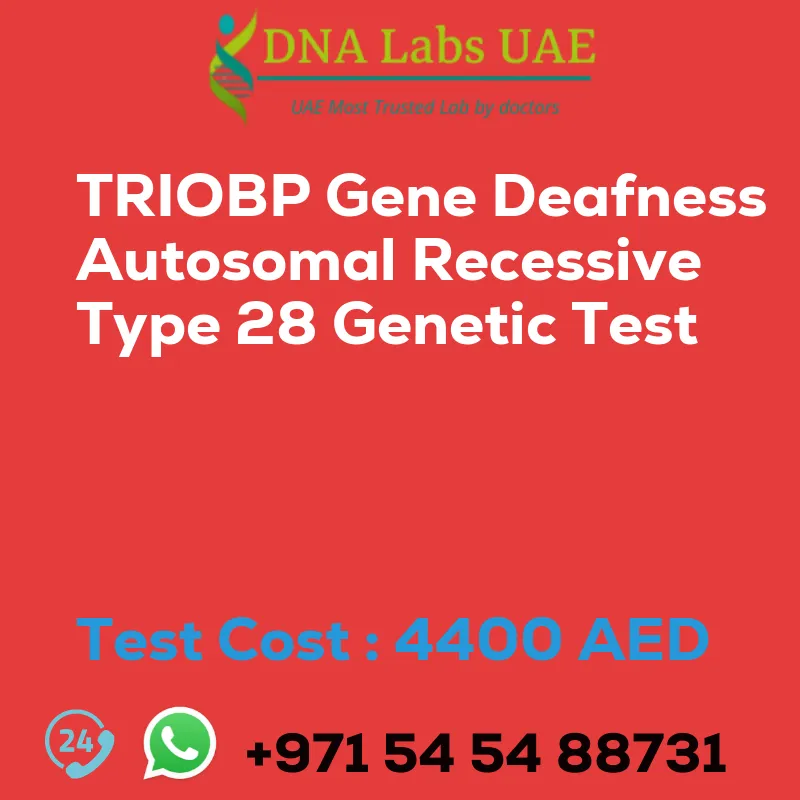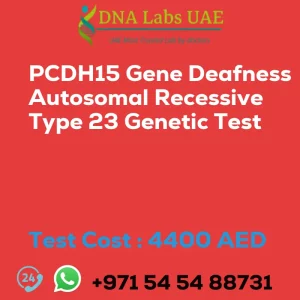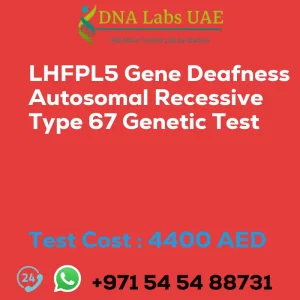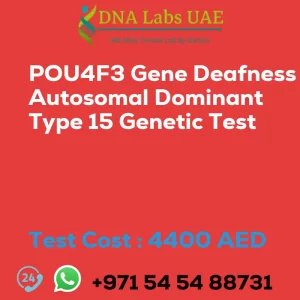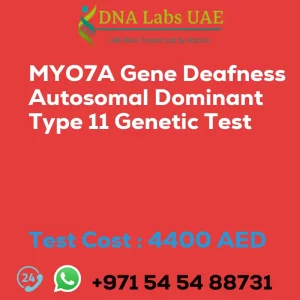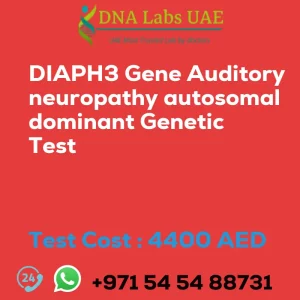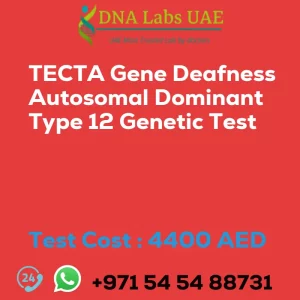TRIOBP Gene Deafness Autosomal Recessive Type 28 Genetic Test
Welcome to DNA Labs UAE, your trusted genetic testing laboratory in the UAE. We offer the TRIOBP Gene Deafness Autosomal Recessive Type 28 Genetic Test at a cost of AED 4400.0.
Test Details
The TRIOBP gene is associated with a type of deafness known as autosomal recessive type 28 (DFNB28). This means that an individual must inherit two copies of the mutated gene, one from each parent, in order to develop the condition.
Our genetic testing method, Next-Generation Sequencing (NGS) Technology, allows for the analysis of multiple genes simultaneously. In the context of deafness, NGS can be used to identify mutations in the TRIOBP gene, among others, to help diagnose the underlying cause of an individual’s hearing loss.
Test Components and Price
- Test Name: TRIOBP Gene Deafness Autosomal Recessive Type 28 Genetic Test
- Components: Blood or Extracted DNA or One drop Blood on FTA Card
- Price: AED 4400.0
Report Delivery
Once the sample is received, the report will be delivered within 3 to 4 weeks.
Test Type and Doctor
Test Type: Ear Nose Throat Disorders
Doctor: ENT Doctor
Test Department
Test Department: Genetics
Pre Test Information
Before undergoing the TRIOBP Gene Deafness Autosomal Recessive Type 28 Genetic Test, it is important to provide the clinical history of the patient who is going for the EYA1 Gene Branchiootic syndrome type 1 NGS Genetic DNA Test. Additionally, a genetic counseling session may be conducted to draw a pedigree chart of family members affected with the EYA1 Gene Branchiootic syndrome type 1 NGS Genetic DNA Test gene EYA8.
About the TRIOBP Gene
The TRIOBP gene provides instructions for making a protein called TRIO and F-actin binding protein (TRIOBP). This protein is involved in the development and maintenance of hair cells in the inner ear, which are responsible for detecting sound and transmitting signals to the brain. Mutations in the TRIOBP gene can disrupt the normal function of these hair cells, leading to hearing loss.
Genetic Testing for DFNB28
Genetic testing for DFNB28 can help confirm a diagnosis of autosomal recessive deafness and provide information about the specific mutation in the TRIOBP gene. This information can be valuable for genetic counseling, as it can help determine the likelihood of passing the condition on to future generations and guide treatment options.
It is important to note that genetic testing should be done under the guidance of a healthcare professional or genetic counselor, who can help interpret the results and provide appropriate recommendations based on an individual’s specific situation.
| Test Name | TRIOBP Gene Deafness autosomal recessive type 28 Genetic Test |
|---|---|
| Components | |
| Price | 4400.0 AED |
| Sample Condition | Blood or Extracted DNA or One drop Blood on FTA Card |
| Report Delivery | 3 to 4 Weeks |
| Method | NGS Technology |
| Test type | Ear Nose Throat Disorders |
| Doctor | ENT Doctor |
| Test Department: | Genetics |
| Pre Test Information | Clinical History of Patient who is going for EYA1 Gene Branchiootic syndrome type 1 NGS Genetic DNA Test. A Genetic Counselling session to draw a pedigree chart of family members affected with EYA1 Gene Branchiootic syndrome type 1 NGS Genetic DNA Test gene EYA8 |
| Test Details | The TRIOBP gene is associated with a type of deafness known as autosomal recessive type 28 (DFNB28). Autosomal recessive means that an individual must inherit two copies of the mutated gene, one from each parent, in order to develop the condition. NGS (Next-Generation Sequencing) is a genetic testing method that allows for the analysis of multiple genes simultaneously. In the context of deafness, NGS can be used to identify mutations in the TRIOBP gene, among others, to help diagnose the underlying cause of an individual’s hearing loss. The TRIOBP gene provides instructions for making a protein called TRIO and F-actin binding protein (TRIOBP). This protein is involved in the development and maintenance of hair cells in the inner ear, which are responsible for detecting sound and transmitting signals to the brain. Mutations in the TRIOBP gene can disrupt the normal function of these hair cells, leading to hearing loss. Genetic testing for DFNB28 can help confirm a diagnosis of autosomal recessive deafness and provide information about the specific mutation in the TRIOBP gene. This information can be valuable for genetic counseling, as it can help determine the likelihood of passing the condition on to future generations and guide treatment options. It is important to note that genetic testing should be done under the guidance of a healthcare professional or genetic counselor, who can help interpret the results and provide appropriate recommendations based on an individual’s specific situation. |

